heyo! the name's Dante. lets review: my life is spiraling out of control and I have declared FAFSA as my #1 enemy. this studyblr blog is mainly for academia related shenanigans and adulting tidbits as i have since had to drop out of community college due to being broke. credit to the wonderful @momogaoka for header and to cute picrew by @Djarn for my avatar. main is @dantedeletes
Don't wanna be here? Send us removal request.
Text
Okay this is gong to sound condescending on several levels but:
There's a kind of cliche about training a dog - that if you want it to always come when it's called, you should never scream at or punish it when it does. Even if you just spent twenty minutes getting increasingly panicked thinking it was dead in the woods! Even if it had been trampling through the neighbors garden! It is very important that it's direct association is 'stopping whatever super interesting thing I was doing to go back to human = being praised and rewarded'. If the association is instead being screamed at or punished, the dog will be less enthusiastic to stop whatever fun thing it's doing to run to that.
I feel like a great many people would noticably improve their own lives if they started applying the same logic to how they treated other humans.
17K notes
·
View notes
Text
what doesn't kill you makes you really weird about pain and dopamine
5K notes
·
View notes
Text
One of the stranger things about training brand new nurses is explaining how to min max small talk. It feels very weird to coach people on how to chat.
50K notes
·
View notes
Text
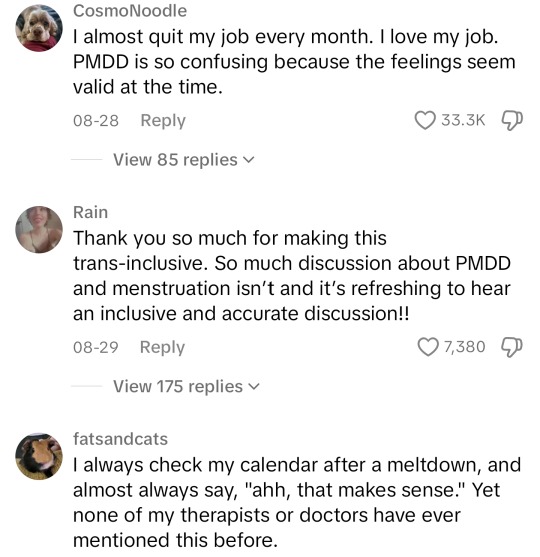
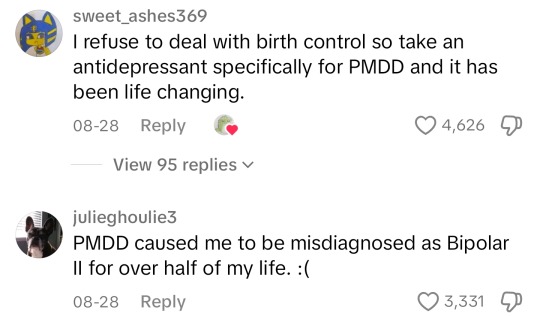

10K notes
·
View notes
Text
there is a very real tendency of teenagers with anxiety disorders self diagnosing with considerably more stigmatized and impairing mental illnesses (e.g. schizophrenia, DID, personality disorders), but the best response to that isn't to get angry with them for "appropriating" lol. instead you show them coping resources for the problems they're actually having and deemphasize diagnostic categories in general. if an 18 year old is claiming to have alzheimer's, they're probably making an innocent mistake and are in genuine distress. be kind.
98K notes
·
View notes
Text
Ask I got on my sideblog but am answering here:
Hi there! I know you're a therapist and I have a question: I saw some people arguing on Twitter about the impacts of trauma. There was a therapist among them, and they had a masters degree in social work, they post about it often. They say that people who have experienced trauma hurt other people because it benefits them or gives them pleasure, and they are disconnected from empathy and sympathy. That seems wrong, but maybe it's not? That's all, thanks!
Ooof, yeah, that's... complicated. It's technically true, but also frequently used as a lie.
Trigger warning: Child abuse, child grooming, interpersonal violence, trauma (childhood & intergenerational), true crime, totalitarianism
Because basically, that describes MOST humans who decide to hurt other humans on purpose without a strong ulterior motive. That's not a trauma thing, that's a human thing.
I babysit for a family with a 1-year-old and a 3-year-old. When the 1yo does something to upset their older sibling, and that sibling winds up and smacks them, that's the same basic thing. It benefits them (makes 1yo go away), brings them pleasure (having an outlet for their anger is very satisfying), and they're disconnected from empathy (they're often surprised and confused when the 1yo is crying, because they're 3 and THEY feel fine and they don't really understand yet that other people's feelings really exist) or even sympathy (understanding that if you hit someone, they will probably be upset). That's something we adults have to watch out for and intervene in, because empathy and impulse control take time to learn.
But as for where trauma figures into this... how to explain.
There's this old logical puzzle about categories, where you say things like:
All dogs have four legs*
A dog is an animal
And then the catch is that you can't extend that to say
All animals have four legs
*RIP to all the tripods and legless animals that apparently aren't dogs anymore for the purposes of this logic exercise
Animals obviously include fish and millipedes and whales and snakes and jellyfish. The number of legs an animal can have is HIGHLY diverse, and will eventually lead to a debate on what the definition of "leg" is.
So there is this common thing we see:
Some people are much more violent and aggressive than other people
These violent and aggressive people have almost always experienced some form of trauma/abuse/neglect
And the link people are really prone to thinking is:
People who have experienced trauma/abuse/neglect will go on to being violent and aggressive with other people.
This is incorrect. To some degree, I can see why it's widely believed - after all, way more people tune in to learn about a serial killer's abusive childhood than for the more common story, which is survivors of trauma slowly going about their lives in ordinary undramatic ways.
Because the thing is, trauma is REALLY diverse. Humans are inherently varied and a bit chaotic, since we can choose very different ways to live and operate, and trauma splits that variability like a prism turning light into a rainbow. Only about 30% of abused children grow up to be abusive themselves. The other 70% choose very different lives.
And yet. My eternal question is: WHY is this such a meme? Why do so many people with a shitty childhood flinch at the 30% statistic and think, "Is that me? Am I destined to be a monster?" Why does this story have legs, when so many other facts about trauma have way more empirical backing and usefulness and get very little attention?
I submit that there is one group that fucking LOVES the idea that traumatized person equals abuser. One group that pushes it into the discourse, in international media or around the family kitchen table, with great ingenuity and gusto.
Abusers.
They love it for two reasons. The most obvious reason is: It absolves them of their actions. "It wasn't ME who hit you, it was my childhood trauma!" A veritable classic excuse that takes their agency out of the equation. And it really can be hard to tell when it's a good excuse and when it isn't!
Reason two is the more insidious one: It cuts their victim's sense of goodness, worthiness, and moral certainty out from under them.
It's as simple as saying, "Look at how you pushed back at me (when I was abusing you)! You're the REAL abuser here!" It's the heart of what domestic abuse researchers call DARVO (Deny, Attack, Reverse Victim and Offender). It can be that simple, or it can be so complicated and byzantine it makes your head hurt.
I only really got a handle on understanding this thanks to a friend, who said she was okay with me sharing this story if I didn't identify her. I won't go into any unrelated details of her abuse, but for the record, hers is probably the most extreme case of anyone I've personally interacted with, and I used to work as a therapist and in domestic violence shelters. Her dad heinously abused her as a child. He'd also studied psychology in university. I have been trying to fathom how the fuck anyone could do what he did to her for YEARS, and I think I've got a few viabletheories.
So. She was an ordinary child, bright, warmhearted, well-behaved, and a bit autistic. A bit more naive and trusting than your average preschooler. I imagine that from his perspective, there was the convenient benefit that he often had unrestricted access to her, and he could relatively easily overpower and manipulate her.
But she had one serious downside: If anyone ever found out what he was doing to her, they would go fucking apeshit. She wasn't really prone to lying or acting out, so people would treat her as a fairly credible reporter; several other adults found her she was lovable, innocent, and endearing; and what he wanted to do to her was, I repeat, heinous.
So while he abused her, one of the things he said was: "I'm doing this because I was abused as a child. That's how it works. All abusers come from abuse. There are statistics proving it. This means you're an abuser too. See what society thinks about child abusers? That's what people will think about you, if they know that you've been abused."
And she was, you know, a child, not someone who studied psych research. He was her dad. So she believed him.
She thought that he was using his adult brain to correctly assess the truth about her as a person, for purely objective reasons. The way you'd try to teach a kid who talks with their mouth full about table manners. It's been a couple decades now, but she is still very slowly chipping away at her core belief that she is inherently awful and only her father recognized the truth about her.
Sometimes when we talk about it I have to bite my tongue because I'm sitting here trying to figure out what the fuck was going on with him, an adult man who wanted to abuse her because he'd really enjoy it. I think about him trying to figure out how to manipulate an innocent child into accepting being abused, and minimize the risk that he'd go to jail for it. And although I hate his everloving guts, I'm almost a bit impressed at his level of machiavellian audacity, to come up with a line that was SUCH hot bullshit that people have devoted their entire careers into proving it false, and yet, because it hit exactly the right psychological issue at exactly the right psychological stage and his intended victim was so trusting, he could get her to believe him enough to turn that lie into her core identity.
Praise be to G-d and Criminal Minds, he did not, in the end, get away with it. She got enough courage to tell people, and get free of him. And she is not, in fact, a horrible abusive person.
But I think what he did so very brazenly is what a lot of abusers do, in more disguised and indirect ways. Probably partly because it really helps, when abusing people, not to treat them like human beings with their own thoughts and feelings, but if one must posit that they have something going on between their ears, it's easiest to assume that everyone else responds to trauma with aggression and abuse. After all, considering the possibility that someone like them could choose not to be abusive takes all the fun and plausible deniability out of the whole affair.
But now I see echoes of that "my victims are just as bad as I am" tactic all over the place. I honestly think it's a very similar mechanism that Hannah Arendt pointed out in The Origins of Totalitarianism. She observes that violent totalitarian regimes routinely accuse their intended victims of the very act they intend to commit themselves, to justify a "retaliation" that's actually just aggression. Think claiming "Our opponents are rigging this election" as an excuse to rig an election in the opposite direction.)
To sum up: You're human. Humans can do good and bad things. It's not necessarily good to completely forswear anything violent or angry in you, but to come up with a framework of how to be assertive and get your needs met in an ethical fashion. There are times it is appropriate and even necessary to escape or fight against somebody else's will.
On the other hand, If find yourself inflicting pain on other people on a regular basis, get some support and take a good hard look at your life choices. Sometimes it's hard to figure out how to solve problems in your life without violence or aggression, and you might need some help with that. Maybe talk to a counsellor or learn anger management skills.
But in no way is it predestined, inherent, implicit, or doomed, that your experiences and brain wiring make you violent or evil. You always have the choice to define yourself beyond what was done to you.
328 notes
·
View notes
Text

I've been finding a lot of job postings that ask me for a photo lately, which is uncool of them.
So I made an image which lets me bypass their demand. I don't care if I get that particular job, I just want to shame the HR goons who thought the photo requirement was a good idea.
Note: this only applies in the USA.
22K notes
·
View notes
Text


social media vs reality: my desk
2K notes
·
View notes
Text
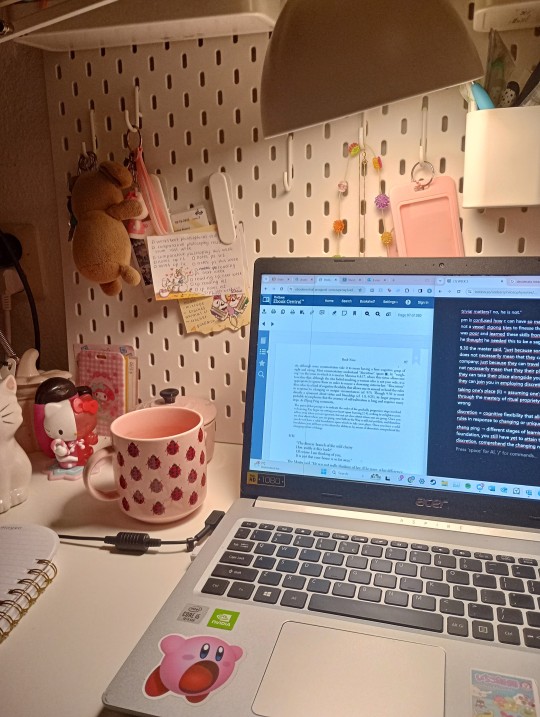
i like reading the analects, i actually like university and i love studying... i just dont like feeling tired, anxious or being broke 🥹
358 notes
·
View notes
Text
I teach a lot of undergrads these days. About 3 years ago, I started dedicating a full two hours early every semester to a lecture and discussion about the history of the concept of plagiarism, because I was so annoyed that my students were walking into my classroom with the ironclad belief that they weren't plagiarizing when they were. Sure, the university had some official plagiarism guidelines that they could hypothetically read in a code of conduct somewhere, but they didn't. All they had was a vague memory of some teacher in Grade 8 telling them 'don't copy and paste from wikipedia' and a little learning from experience afterwards.
My hypothesis (which I was delighted to find is shared by Brian Deer, the journalist who broke the Wakefield story and who was the source Illuminaughti plagiarized in the hbomberguy video) is that the rise of automatic plagiarism checkers meant that, in the minds of many students, the formerly more abstract concept of plagiarism ('passing someone else's work off as your own') became a more concrete concept operationalized by the plagiarism checker. Under this concept, a text is plagiarized if (and, implicitly, only if) it is detected as plagiarism by the plagiarism checker. I have spent many hours with students sobbing in my office after I told them that their essays were plagiarized, and they all say that they thought changing the words around was sufficient to make it not plagiarized. Maybe some of them were lying for sympathy, maybe they all were, but I see no reason to not take them at their word. They think that what they're doing is dubious (hence the shame) but they don't think it falls under what they take to be the definition of plagiarism - the thing they can face sanction from the university for. They need to have it pointed out to them that there has been plagiarism for a lot longer than there have been automatic 'plagiarism checkers' and that as their professor, I'm the only plagiarism checker they really need to be concerned about.
It's really easy for me to get frustrated about this. It's frustrating to me that the American public high school system (the source of the majority of my students) has failed to prepare them to think about information, facts, and where they come from. It's frustrating that students can't be arsed to read the university's code of conduct and that the only way I know they have is if I read it straight to their faces. It's very frustrating to see the written scholarly word, a medium to which I have dedicated no small part of my life, treated like it's not worth anything. I'm frustrated to know that most students are not in my class, or in the class of someone else prepared to teach this lesson, so they'll go through their whole lives thinking that an uncited light paraphrase is enough to be worthy of credit. I'm frustrated that people with such a lax attitude towards information are my fellow voters. I once read a real fucking academic essay that was submitted for grades that cited a long quote from Arthur Conan Doyle that, when I traced it, was actually a quote from a fucking TJLC blog. That one isn't frustrating, I guess, that's just funny. It's not all bad.
I'm glad for the hbomberguy video. I hope it will make it easier to convince my students in future. It's too bad he didn't go into the academic context, but it's not like he was short on things to talk about already.
But this is a more general problem than just the video essay context shows. If we're not careful, the very concept of plagiarism can get eroded. I'm not a linguistic prescriptivist, either! If enough people start taking this new concept as plagiarism, that will be what it becomes. I think a world in which that notion of plagiarism is the relevant one would be a worse world. Don't let people erode the idea of credit. You're going to want it later.
27K notes
·
View notes
Text

Leonid Pasternak (Ukrainian, 1862–1945) - The Torments of Creative Work
150K notes
·
View notes
Text
Unlearning How White People Ask Personal Questions
http://www.samefacts.com/2014/05/culture-and-civil-society/unlearning-how-white-people-ask-personal-questions/
110K notes
·
View notes
Text
Things that will make your computer meaningfully faster:
Replacing a HDD with an SSD
Adding RAM
Graphics cards if you're nasty
Uninstalling resource hogs like Norton or McAfee (if you're using Windows then the built-in Windows Security is perfectly fine; if you're using a mac consider bitdefender as a free antivirus or eset as a less resource intensive paid option)
Customizing what runs on startup for your computer
Things that are likely to make internet browsing specifically meaningfully faster:
Installing firefox and setting it up with ublock origin
adding the Auto Tab Discard extension to firefox to sleep unused tabs so that they aren't constantly reloading
Closing some fucking tabs bud I'm sorry I know it hurts I'm guilty of this too
Things that will make your computer faster if you are actually having a problem:
Running malwarebytes and shutting down any malicious programs it finds.
Correcting disk utilization errors
Things that will make your computer superficially faster and may slightly improve your user experience temporarily:
Clearing cache and cookies on your browser
Restarting the computer
Changing your screen resolution
Uninstalling unused browser extensions
Things that do not actually make your computer faster:
Deleting files
Registry cleaners
Defragging your drive
Passively wishing that your computer was faster instead of actually just adding more fucking RAM.
This post is brought to you by the lady with the 7-year-old laptop that she refuses to leave overnight for us to run scans on or take apart so that we can put RAM in it and who insists on coming by for 30-minute visits hoping we can make her computer faster.
132K notes
·
View notes
Text
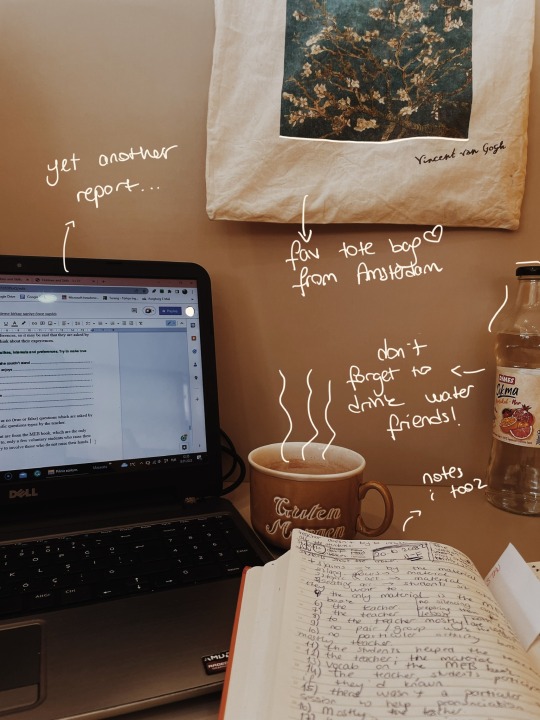
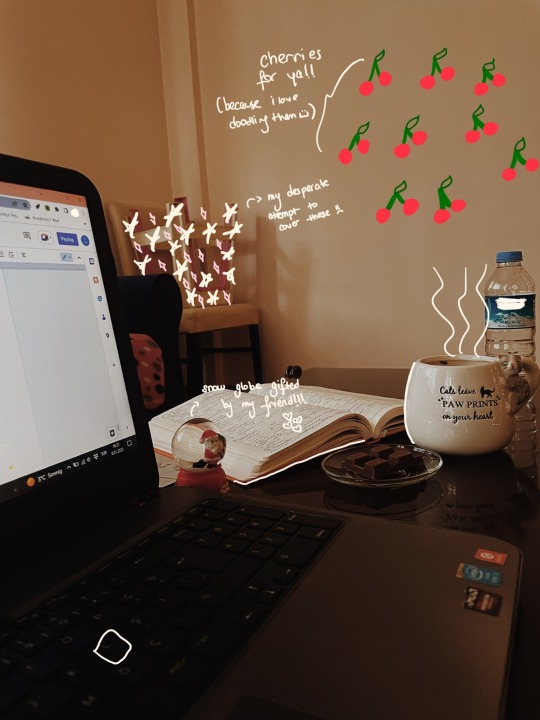
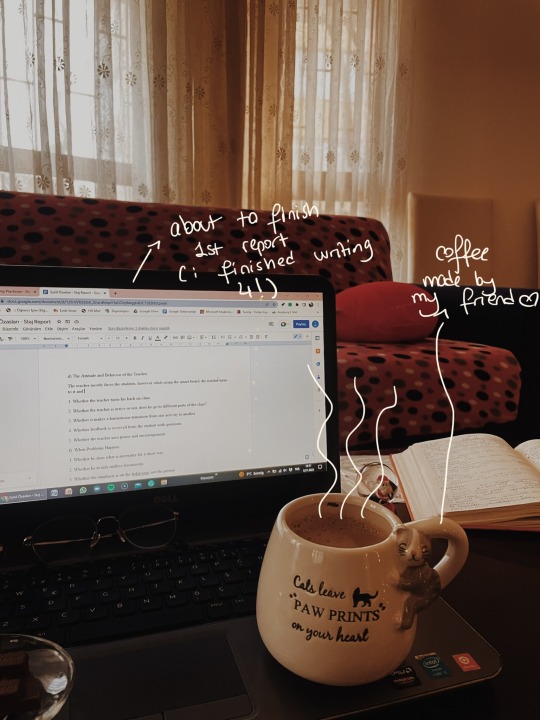

08.01.2023 • sunday
spent the day writing my reports. i was studying in my dorm but then my friend invited me to her place so we spent hours together baking, studying, talking and just chilling. it was very nice<3. she gave me my new year’s gift and i gave her hers!!
p.s. i’m really loving this doodling on the pics thing, can you tell?
7K notes
·
View notes
Text

Romanticizing studying/education
While I am not currently enrolled in college, something I found incredibly helpful when it came to studying and taking notes was fully romanticizing it. And by that I mean going all the way in— I would put on a classical music playlist and set my LEDs to a warm orange tone and pretend I was a young scholar in ye olden days studying by candlelight, and a couple hours later I’d have half a notebook filled with color-coded notes. Another time I put on some film noir jazz and rain ambience and imagined I was a tired, grizzled detective working tirelessly on a cold case that just wasn’t making sense. And sure enough, I would have pages upon pages of notes and work completed by the end of the night. It sounds really silly but I shocked myself with how well it worked, and I wanted to share my experience with it in case it can help anyone else!
7K notes
·
View notes

